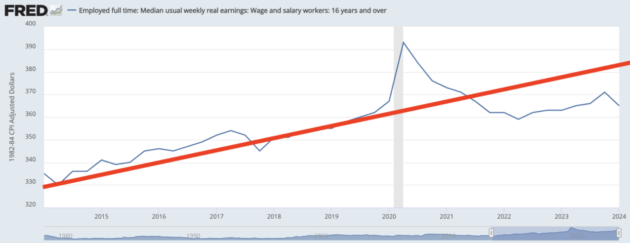Breitbart Business Digest: One Chart Shows Why So Many People Hate the Biden Economy
Inflation, Not Partisanship, Explains Depressed Consumer Sentiment
There’s really no mystery why so many people are unhappy with the Biden economy.
To paraphrase James Carville: It’s the inflation, stupid.
The Biden administration and its hallelujah chorus in the establishment media have convinced themselves that the problem is that the American people just do not know how good they have it. They seriously contend and apparently honestly believe that the media is biased against Biden and therefore poisoning the minds of the American people about just how good the economy is.
There are more sophisticated versions of this. Some contend that the problem is that the media is biased toward negative economic stories rather than against President Biden. Of course, these same people tend only to discover this bias when a Democrat is in office. Apparently, when a Republican is in office, the coverage is just fair and balanced.
Another version contends that its all just partisanship. The public at large is not really down about the economy, only Republicans are. Paul Krugman is the leader of the hateful Republican school of analysis.
It’s true that consumer sentiment is still weaker than you might expect given the economic numbers. But that’s largely partisanship. Using Civiqs numbers, Democrats have more or less fully accepted the good news 3/ pic.twitter.com/jDykPsPBsg
— Paul Krugman (@paulkrugman) February 10, 2024
There’s no doubt a partisan element at work, but that probably does not cut the way Krugman thinks it does. Republican sentiment about the economy turned much more sour when Biden took office, and Democrats turned more positive. But a far more elegant and straightforward interpretation of that is simply that Republicans correctly assessed that Biden’s policies would be damaging to the economy, and Democrats rallied behind their guy.
Inflation Pushed Down Consumer Sentiment Again
The Krugman thesis does not at all explain shifts in consumer sentiment during Biden’s presidency. The latest report on consumer sentiment from the University of Michigan showed Americans becoming much less happy about current conditions and much less optimistic about the future. That’s probably not caused by a sudden shift in the electorate toward identifying as Republicans. More likely, it reflects economic fundamentals.
More specifically, it reflects the experience of resurgent inflation and the expectation that inflation will not be coming down soon. Year-ahead inflation expectations rose from 3.2 percent in April to 3.5 percent in May, a significant increase. Prior to the pandemic and Biden taking office, expectations ranged between 2.3 percent and three percent. The long-run inflation expectations moved up from 3.0 percent to 3.1 percent. Prepandemic, long-run expectations ranged from 2.2 percent to 2.6 percent.
The Bidenomicistas argue that Americans should be happy despite inflation because real wages are now higher than they were prepandemic. But this is deceptive. It is true that real wages moved higher than they were prepandemic at the end of 2023. But only barely. And they’ve now fallen slightly below the pre-pandemic peak.
What’s more, real wages—that is, wages after inflation—have not caught where they would have been had we recovered to the pre-Biden trend. As the chart below shows, real wages are far below where they would be if they had just kept rising at the pace they were when Trump was president.

Here’s a version of the chart showing the trend line.
The gap between the red line trend and inflation-adjusted wages explains a good deal of the public’s dissatisfaction with Biden’s economic stewardship. And the fact that inflation is once again rising suggests that the situation is unlikely to improve.
Our friend Jason Trennert of Strategas recently captured things nicely in a post on X:
The NYT, WSJ, & the FT have all now written articles suggesting that people are too stupid to realize that inflation is not as bad as what they see with their own eyes. As an election issue, the inflation debate is over and President Biden lost. https://t.co/CgQSpz1gtP
— Jason De Sena Trennert (@JasonTrennert_) May 10, 2024
Next week will bring another report on inflation, and it looks like it will again be bad news.
The Biden administration may very well claim it’s just a distraction from how good things really are. That’s not a message that has helped them so far, and it probably will not garner much support between now and election day.






Comments are closed.